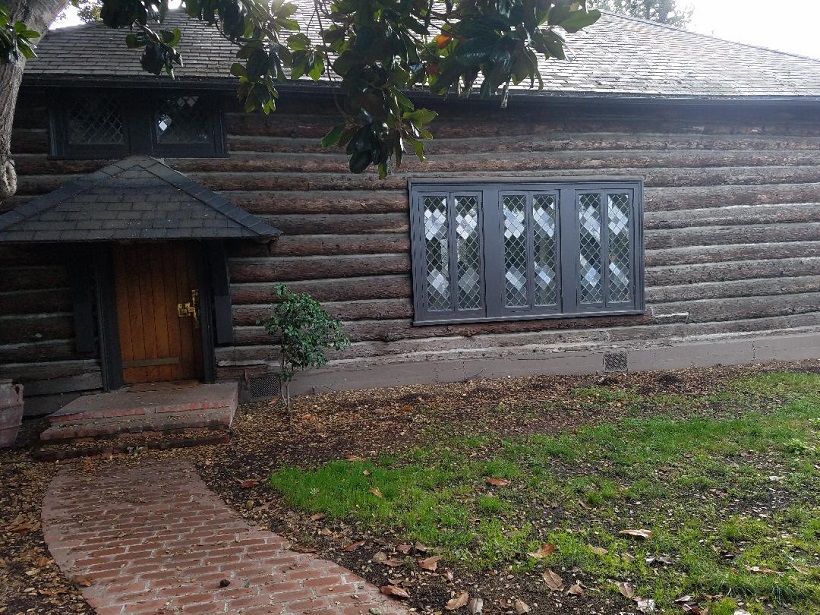The architectural styles of Peninsula cities range from rancher tracts to mansions, but Redwood City is probably unique for having a log cabin in a neighborhood where the streets have rustic names such as Orchard and Oakwood.
Log cabin may be a misnomer, however. Palatial hunting lodge would be a more accurate way to describe the house at 302 Orchard, even though it was built of redwood logs and, from the outside, resembles a set for a movie about Abe Lincoln. Inside, the house boasts vaulted 32-feet-high ceilings, paneled walls, detailed moldings, wood flooring and hammered bronze chandeliers.
The present owners, Erin Akred and her husband, John, love the place. “John records music, and the high ceilings make for perfect acoustics,” said Erin, who has lived in the house for four years. John Akred’s recording company is appropriately called Melody Hunting Lodge.
The lodge carries a lot of history. The original owner was State Supreme Court Justice Frederick Henshaw, who built it on his spacious Selby Lane Atherton estate. The exact date the house was built is not definite, but it was moved by horse power to its present location south of Woodside Road somewhere around 1898.
“No,” Erin Akred said laughingly when asked if she still had the animal heads that once lined the walls of the main room, which measures about 30 feet by 50 feet and has no center supports. The Redwood City Tribune reported in an article in 1976 that the heads of two elk, two moose, a wildcat, Alaskan goat, and stuffed duck, white owl and raccoon decorated the walls. The newspaper reported there were no nails in the building, only wooden pegs, and added that the lodge’s leaded windows were imported from a castle in England.
In the story headlined “Not your Ordinary Home,” the newspaper said the main room contained guns, a crank-type telephone, a player piano, and one of Edison’s first phonographs. Gerald and Lois Jones owned the lodge when the story was published. In 1968 a family wedding was held in the main room which was able to hold more than 200 guests.
“Here Today,” an elaborate picture book of historic sites features photos of the striking Henshaw hunting lodge. The book was published by the Junior League of San Francisco. Henshaw, who died in 1929, is registered in the 1913 “Our Society Blue Book” that lists his home as Redwood City.
The lodge, which won the Mayor’s Beautification Award for best compatible building and garden landscaping in 2005, has a better reputation than Henshaw who can be viewed as an upstanding man – or not.
In 1894 he was elected to a 12-year term on the California Supreme Court and was reelected for another 12 years in 1906 but resigned in 1917. There was only one other justice who produced more opinions selected by case book writers. However, the shadow of bribery accusations haunts his legacy.
According to “A Debonair Scoundrel,” a 1962 book written by Lately Thomas, Henshaw accepted a $400,000 bribe to “reverse his vote in a contest over the will of the Comstock mining king, James G. Fair.” The $50 million fortune had been left in trust. Henshaw’s action broke the will and turned over millions of dollars directly to the heirs.
In contrast, author Edward Johnson praised Henshaw in his “History of Supreme Court Justices of California, 1850-1900.” He claimed Henshaw was one of two or three best known as a writer of sound law, but he conceded that “there will be those who will always be curious as to whether Henshaw was innocent.”
This story was published in the February print edition of Climate Magazine.






